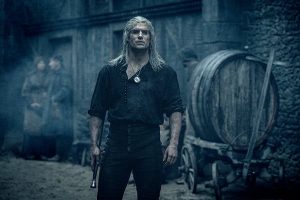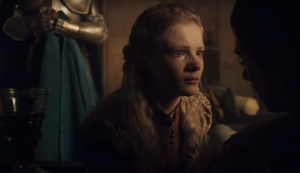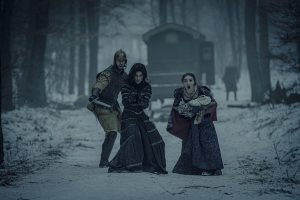Netflix’s hotly-anticipated adaptation of Polish author Andrzej Sapkowski’s fantasy novels and short story anthologies hit the ground running yesterday, quickly gathering a tightly-knit fan community and garnering praise from viewers. Its low Rotten Tomatoes score suggests disapproval from critics, but for my part, I have to say I’m one of those who simply can’t get enough of the “grimdark” fantasy world that Sapkowski created, and showrunner Lauren S. Hissrich has lovingly brought to life.

The world of The Witcher is a twisted, messed-up place filled with hostile countries and city-states tenuously held together by the secret machinations of royal mages. In this world, mutated men called Witchers roam the violent backwoods corners of The Continent, hunting monsters for a price and carving out brutal, lonely lives for themselves. Our protagonist, the semi-heroic Geralt of Rivia (Henry Cavill) is one of the most legendary, but also the most feared and reviled: where he goes, trouble follows, and people are eager to chase him away whenever he comes close.
Cavill, despite playing a brooding, hulking warrior devoid of human emotions, is surprisingly charismatic and endearing – his enthusiasm for the source material is evident (Cavill has an almost encyclopedic knowledge of both the novels and the accompanying video games), and that same enthusiasm shines through most clearly in his action sequences and fight scenes, all of which Cavill himself performed without the help of stunt doubles. And even though many of us worried that his long, silvery locks and bright yellow eyes made him look like he was wearing a Halloween costume, Cavill rocks the strange but unique style – except in Episode 2, for whatever reason: possibly because it’s the most brightly lit in the entire season, and it accentuates how unnaturally yellow and inexpressive his contact lenses really are. I understand that Cavill doesn’t want to give up the coveted role of Superman in the DCEU – but after watching The Witcher, I think it should be clear that, with his gruff voice and intense physicality, the actor was born and bred for roles like these, where he can let loose and be a feral, ferocious, demon-slaying mercenary. It’s impossible to even imagine him going back to the squeaky-clean Superman persona after this.

But while Cavill is getting a lot of attention for carrying the show, the talents of his female co-stars Anya Chalotra and Freya Allen are just as worthy of praiseworthy ballads (speaking of which, I’m going to have “Toss A Coin To Your Witcher” stuck in my head for weeks). Chalotra, especially, does a fantastic job as the troubled sorceress Yennefer of Vengerburg, whose journey begins in a town full of bigots who mock her for her physical disabilities – her own father eventually sells her off to a mage for a bargain price. But Yennefer rises above the haters and becomes one of the series’ strongest and most iron-willed characters, as she trains to become The Continent’s most powerful mage. Her story would be especially fascinating no matter what, because it brings us, the audience, into contact with the various guilds of magicians and sorcerers who command The Continent’s destiny, but Chalotra manages to elevate every scene she’s in and make Yennefer our eyes and ears in the show’s most obviously fantastical subplot. She doesn’t get as many fight scenes, but those that she does have (especially in the finale) are epic. Freya Allen portrays Princess Cirilla, or “Ciri”, of Cintra, a stubborn and resilient young girl who is forced to flee from her grandmother’s sheltered palace after the walls are breached by invaders from the shadow lands of Nilfgaard. Alone, and surrounded by people who want to kill her, Ciri sets out into the wilderness with only a name to guide her: the name of Geralt of Rivia, who is supposedly destined to help her. Allen is very good, and possesses a cheerfully expressive face, but her character is rather enigmatic, even by the end of the season, making it ever so slightly more difficult to relate to her in the same way as the older, wiser Yennefer.
The series is structured as something of an anthology, so many of the supporting cast only make a handful of appearances – but even so, there are several highlights. Jodhi May as Ciri’s grandmother Queen Calanthe is a complex and divisive character who is alternately loved, respected, feared or hated – and her unpredictability keeps her friends and enemies on their toes at all times. Anna Shaffer’s Triss Marigold is the show’s most traditionally “witchy” witch, and does a very good job of it; while Mimi Ndiweni is utterly terrifying as the Nilfgaard mage Fringilla Vigo, a callous, sadistic conqueror. The male cast includes Geralt’s on-and-off traveling companion Jaskier (Joey Batey) who has a surprisingly modern vocabulary and a tendency to very nearly break the fourth wall at times (“There I go again, just delivering exposition” he comments at one point), and daredevil Vilgefortz (Mahesh Jadu), who’s stunts and unique brand of magic are incredibly entertaining to watch.

At its heart, the show is a cunning blend of subversive fantasy and horror – and the horror elements are particularly strong, mostly because they’re intricately tied up in the world’s magic system. It’s never explained exactly where many of The Continent’s monsters, ghouls and demons come from, but it’s fun enough bracing yourself for the jump-scare moments when they burst from the ground, or from tombs, or lakes, or tall grass, etc, etc. Probably the best of the lot is the demon princess living in a crypt below a Temerian castle that seems to have been pulled straight from a Dracula adaptation (Temeria itself seems to be obviously based on Transylvania), but other highlights include a malevolent shapeshifter that eats children, and a dragon with a peculiar secret – I’m sure Sapkowski’s novels have plenty of material to draw from in the second season, but I wouldn’t mind seeing a Witcher take on the character of Baba Yaga, who I think would fit in perfectly with the assortment of other creatures on the show.
This is a non-spoiler review, so I won’t say too much about the series’ conclusion, or its various twists, turns and surprises – but I can at least assure you that almost all of them are legitimately exciting, and there are a number of storytelling devices employed that shake things up in an intriguing and often suspenseful fashion. Netflix is often criticized for making their original series’ too long, but The Witcher is a perfect length – in fact, by the end of it, you’ll probably be left hungry for more (not to mention angry at Netflix for concluding this first season on a moment that isn’t quite a cliffhanger, but definitely sizzles with palpable tension).
So if you’re looking for a new, dark, twisted fantasy tale, or if you’ve been left disappointed by Game Of Thrones and want to fill the gaping void in your life, try out The Witcher (Thrones fans, in particular, will be pleased to know that the series has many of the former series’ same hallmarks, such as gritty realism and brutal fight scenes, while including things HBO’s long-running fantasy drama never dared to add, such as unmistakable magic). It’s a show that will leave you thrilled, a little scared for your life, and eager to see more of Sapkowski and Hissrich’s world.
Series Rating: 7.9/10
